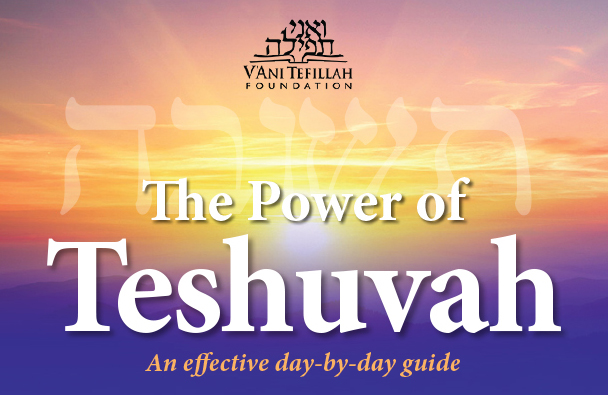The Power of Teshuvah – Day 4

Day 4
Teshuvah: Damage Undone
Entranced by a delicate crystal vase that occupies the center of the dining-room table, little Chaim climbs onto a chair. “No, no, mustn’t touch,” cautions the maternal voice in his head. “It’s so shiny. It sparkles with pretty rainbow colors,” responds another voice: this one his own. He leans across the table and reaches for the vase, but as his hand tugs on its rim, it topples and shatters into dozens of jagged pieces.
“Oh, no, I shouldn’t have touched it!” he thinks. “I’ll never do it again,” he vows. “Now I ruined it! Mommy will be so angry.” Tears of regret are streaming down his round cheeks when suddenly, the glittering pieces of the vase join together, the water and flowers resume their places, and the puddle on the table dries up.
Imagine this child’s wide-eyed expression of amazement when he sees his damage undone! That, on a cosmic scale, is the reality of the spiritual power of teshuvah: to undo the damage and fill our lives with material and spiritual blessings.
When God was about to create man, the Torah “questioned”: “If man should sin and be brought to trial before You, the work of Your hand will be in vain, for he will not be able to endure Your judgment.” God replied, “Therefore, I fashioned teshuvah before creating the world.” Yet, since the world was created yeish mei’ayin — a tangible reality out of nothing — how could anything, let alone teshuvah, exist before creation?
The answer can be understood by analyzing a sin as grave as the first murder ever, of Hevel by Kayin. Kayin did teshuvah for his crime. But his teshuvah did not bring Hevel back to life. Killing is not like robbery, where the stolen item can be returned. By what logic can a previous sin, even one as heinous as murder, be forgiven and erased? Why shouldn’t the perpetrator be punished for the damage he has already done?
If someone fully and sincerely repents, then God considers the crime as if it were never committed. Teshuvah turns the yeish of the crime into an ayin: a negation of an act that has already taken place. In this sense, teshuvah was created before the formation of the world because teshuvah returns conditions to where they were before Creation. By its ability to wipe out a past action teshuvah renders the misdeed null and void.
Teshuvah is a totally unique process, in which deeds that have been done can be undone. Since teshuvah “preceded” the natural world, it does not and need not conform to natural law.
One who performs teshuvah demonstrates that he sincerely regrets his actions and at the time he repents feels in his heart that he will never repeat them. God then forgives him and abolishes the misdeed, opening the way for renewed blessings, both material and spiritual. The verse, “For I do not desire the death of the wicked,” is dealing with those who engage in teshuvah.
Many times, we wish we could “rewind” a past episode and act with more wisdom, sensitivity, or caution. This is the essence of the power of teshuvah: a reality that truly defies the natural order, and yet, has been lovingly granted to us as a tool in our hands, to bring blessings to our lives.
Points to Ponder:
-
-
- Teshuvah has the power to abolish an act that has taken place.
- Teshuvah was created by God prior to His creation of the universe, therefore it operates outside the realm of natural laws.
-

